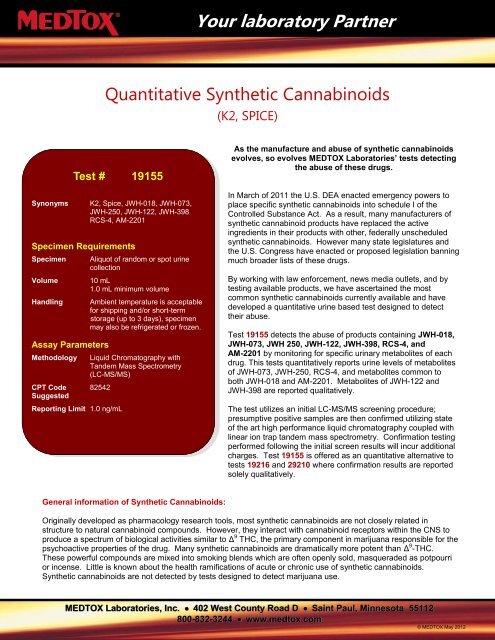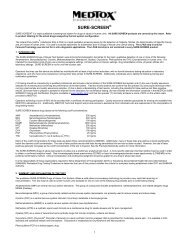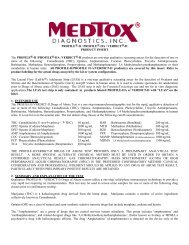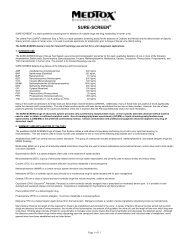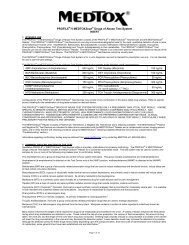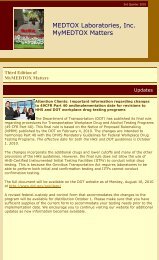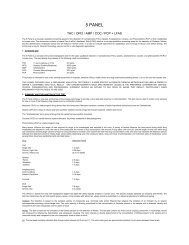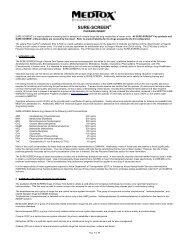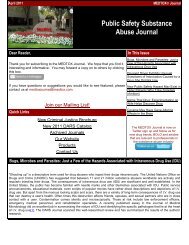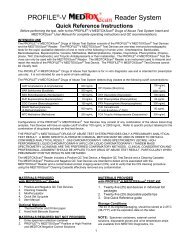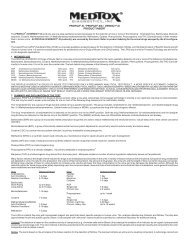Your laboratory Partner - Medtox
Your laboratory Partner - Medtox
Your laboratory Partner - Medtox
You also want an ePaper? Increase the reach of your titles
YUMPU automatically turns print PDFs into web optimized ePapers that Google loves.
<strong>Your</strong> <strong>laboratory</strong> <strong>Partner</strong><br />
Quantitative Synthetic Cannabinoids<br />
(K2, SPICE)<br />
Synonyms<br />
Test # 19155<br />
Specimen Requirements<br />
Specimen<br />
Volume<br />
Handling<br />
Assay Parameters<br />
Methodology<br />
CPT Code 82542<br />
Suggested<br />
Reporting Limit 1.0 ng/mL<br />
K2, Spice, JWH-018, JWH-073,<br />
JWH-250, JWH-122, JWH-398<br />
RCS-4, AM-2201<br />
Aliquot of random or spot urine<br />
collection<br />
10 mL<br />
1.0 mL minimum volume<br />
Ambient temperature is acceptable<br />
for shipping and/or short-term<br />
storage (up to 3 days), specimen<br />
may also be refrigerated or frozen.<br />
Liquid Chromatography with<br />
Tandem Mass Spectrometry<br />
(LC-MS/MS)<br />
As the manufacture and abuse of synthetic cannabinoids<br />
evolves, so evolves MEDTOX Laboratories’ tests detecting<br />
the abuse of these drugs.<br />
In March of 2011 the U.S. DEA enacted emergency powers to<br />
place specific synthetic cannabinoids into schedule I of the<br />
Controlled Substance Act. As a result, many manufacturers of<br />
synthetic cannabinoid products have replaced the active<br />
ingredients in their products with other, federally unscheduled<br />
synthetic cannabinoids. However many state legislatures and<br />
the U.S. Congress have enacted or proposed legislation banning<br />
much broader lists of these drugs.<br />
By working with law enforcement, news media outlets, and by<br />
testing available products, we have ascertained the most<br />
common synthetic cannabinoids currently available and have<br />
developed a quantitative urine based test designed to detect<br />
their abuse.<br />
Test 19155 detects the abuse of products containing JWH-018,<br />
JWH-073, JWH 250, JWH-122, JWH-398, RCS-4, and<br />
AM-2201 by monitoring for specific urinary metabolites of each<br />
drug. This tests quantitatively reports urine levels of metabolites<br />
of JWH-073, JWH-250, RCS-4, and metabolites common to<br />
both JWH-018 and AM-2201. Metabolites of JWH-122 and<br />
JWH-398 are reported qualitatively.<br />
The test utilizes an initial LC-MS/MS screening procedure;<br />
presumptive positive samples are then confirmed utilizing state<br />
of the art high performance liquid chromatography coupled with<br />
linear ion trap tandem mass spectrometry. Confirmation testing<br />
performed following the initial screen results will incur additional<br />
charges. Test 19155 is offered as an quantitative alternative to<br />
tests 19216 and 29210 where confirmation results are reported<br />
solely qualitatively.<br />
General information of Synthetic Cannabinoids:<br />
Originally developed as pharmacology research tools, most synthetic cannabinoids are not closely related in<br />
structure to natural cannabinoid compounds. However, they interact with cannabinoid receptors within the CNS to<br />
produce a spectrum of biological activities similar to Δ 9 THC, the primary component in marijuana responsible for the<br />
psychoactive properties of the drug. Many synthetic cannabinoids are dramatically more potent than Δ 9 -THC.<br />
These powerful compounds are mixed into smoking blends which are often openly sold, masqueraded as potpourri<br />
or incense. Little is known about the health ramifications of acute or chronic use of synthetic cannabinoids.<br />
Synthetic cannabinoids are not detected by tests designed to detect marijuana use.<br />
MEDTOX Laboratories, Inc. 402 West County Road D Saint Paul, Minnesota 55112<br />
800-832<br />
832-32443244 www.medtox.com<br />
© MEDTOX May 2012
MEDTOX<br />
Synthetic Cannabinoids (K2, SPICE)<br />
Testing Highlights<br />
FAQ’s<br />
1. What is “Spice”<br />
The terms Spice, K2, Fake Pot, Mr Nice Guy Incense, etc. refer to commercially available products that contain a<br />
class of research chemicals called synthetic cannabinoids; but these products do not contain any cannabis<br />
(marijuana) components. These products are generally sold as incense or potpourri, but are intended to be<br />
smoked for their psychoactive effects. The cannabinoid-like chemicals contained in these products were<br />
developed in research laboratories to study neuronal cannabinoid receptors distributed in the body and brain.<br />
Synthetic cannabinoids are potent agonists of cannabinoid receptors and when consumed produce effects and<br />
behaviors similar to those of marijuana. Very little is known about the health and safety of these research<br />
compounds.<br />
The synthetic cannabinoids themselves are considered contraband in many European countries and their<br />
possession and use are also prohibited by an increasing number of local governments within the United States. In<br />
2011, the DEA exercised their emergency powers to federally schedule 5 synthetic cannabinoids as Schedule 1,<br />
no legitimate use, narcotics. JWH-018, JWH-073, JWH-200, and CP-49,497 and its C8 homolog are currently<br />
scheduled. However, many more synthetic cannabinoids exist in the scientific literature and many of these<br />
compounds have found there way into smoking blends. It remains unclear if these compounds will be covered by<br />
the analog act.<br />
2. What is MEDTOX actually testing for<br />
The MEDTOX assay for “Spice” is testing characteristic metabolites of the synthetic cannabinoids most<br />
commonly found in incense products. Unchanged parent drug is not found in the urine of users. The MEDTOX<br />
assays detect one or more metabolites of each of the above mentioned compounds. MEDTOX test number<br />
19159 detects metabolites of the two most commonly found, federally scheduled synthetic cannabinoids JWH-<br />
018 and JWH-073 as well as a third less common but federally scheduled compound JWH-200. MEDTOX test<br />
number 19216 detects metabolites of JWH-018, JWH-073 and JWH-200 as well as additional prevalent but<br />
unscheduled synthetic cannabinoids JWH-250, JWH-122, JWH-398, AM-2201, and RCS-4.<br />
3. How are positive results reported<br />
A POSITIVE result will be reported if the sample contains one or more of the targeted synthetic cannabinoid<br />
metabolites. The report includes the name of the specific detected metabolite.<br />
4. Why is the MEDTOX assay believed to be superior to that of other laboratories<br />
MEDTOX Laboratories spice test utilize a two step screen and conditional confirmation procedure. The initial<br />
screening procedure utilizes a sensitive and specific high performance liquid chromatography tandem mass<br />
spectrometry procedure. If cannabinoid metabolites are detected in the first procedure, a second complimentary<br />
assay is performed. The confirmation assay utilizes a quadrupole linear ion trap mass spectrometer to provide<br />
full spectral library matching. The use of a two step confirmation procedure and library matching of mass<br />
spectral data provides the highest level of assurance in the accuracy of a positive determination.<br />
402 West County Road D · Saint Paul, Minnesota 55112<br />
800-832-3244 · www.medtox.com


